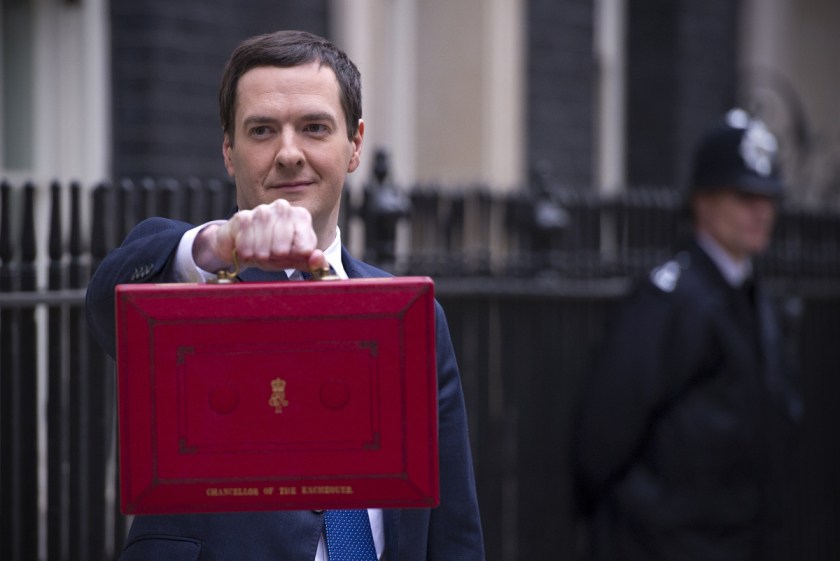-

How the budget will affect accessible and inclusive transport
-
17th March 2016
-
-
by Tom Jeffery
Marketing and Communications Executive
Wednesday saw George Osborne step up to the dispatch box and deliver his 8th budget as Chancellor of the Exchequer. Whilst the budget generated headlines around the issues of education and sugary drinks, there were a number of announcements that affect the provision of accessible and inclusive transport.
What the Government said:
George Osborne got behind the proposed High Speed 3 rail link in the north of England, connecting Manchester and Leeds. £60 million has been announced to develop the service and cut journey times to around 30 minutes. The government also announced improvements to transport connections between other cities in the north of England as part of their northern powerhouse initiative and in line with the recommendations of the National Infrastructure Commission.
The Crossrail 2 project will also receive an £80m investment with the aim of connecting South-West and North-East London. In Wales, the Government announced a £500m contribution to the £1.2bn city deal for Cardiff, which will help to support the electrification of the Valley Line railways.
Many had predicted before the budget that the Chancellor would increase fuel duty for motorists due to the low price of oil currently being experienced. It was a surprise, then, when the Chancellor turned to the issue of fuel duty and announced that there will be no rise, with fuel duty being frozen for the sixth year in a row.
The Chancellor also announced further devolution of power, including transport powers, to more elected mayors for East Anglia, the West of England and Greater Lincolnshire as well as further devolved powers to Greater Manchester.
Also announced was £4.4bn in cuts to the benefits of disabled people over the course of the next parliament including the cutting of £1.2bn from Personal Independence Payments (PIP).
What we’re saying:
At the CTA, we welcome the significant investment in transport infrastructure that this budget brings. Accessible transport extends to railways, and investment in rail links in the north of England, as well as Crossrail 2, will be hugely beneficial to passengers.
As these projects are developed, however, it needs to be ensured that they are developed in a ‘pro social’ way. This means that there needs to be an understanding and prioritisation of the health and well-being benefits that transport can bring and that this investment in services is done in a way that is accessible and inclusive to older, disabled and rural passengers.
Even today, a passenger with restricted mobility, learning difficulties or an older person encounter barriers to entering a station, buying a ticket or boarding a train or bus. Any investment needs also to invest in ensuring transport is ‘pro-social’: accessible, inclusive and working for all members of our communities. This is something that the CTA will be leading on in the coming months, and an area where community transport can be a standard bearer.
The freeze in fuel duty is also welcome. Fuel is clearly a big area of expenditure for community transport operators and any raise in fuel prices would significantly affect them. Freezing fuel duty means that our members won’t have another increasing cost to worry about.
We’re also pleased to hear that there will be further devolution of powers to elected mayors. We believe that if we are to have a Total Transport approach to transport in our communities then there has to be an integrated transport infrastructure built from the ground up. Community transport, we believe, has to be a central and integral part of this. For more information on the role of community transport in the devolution of transport powers, take a look at our recent blog on the IPPR’s report ‘Connecting Lines: How devolving transport policy can transform our cities.’
Other charities and campaigners have been highlighting the potential impact of changes to benefits for disabled people. As a movement that helps people to stay independent and have a good quality of life we have an interest in this too. For our part, we will continue to work with and support community transport operators to be sensitive to how these changes may affect their passengers and ensure that transport does remain accessible and inclusive for them in what may be difficult times.
The budget therefore saw good news for the provision of accessible transport in terms of increased investment in infrastructure and a freeze in fuel duty. We need to ensure, however, that this investment is pro-social, putting passengers, accessibility and inclusivity front and centre.
-
-
- About CTA
- /
- CTA Membership
- /
- CTWeek24
- /
- Policy & Research
- CommunitySolutions: A Manifesto for the Next UK General Election
- Our Campaigning Guide for Community Transport
- Our Policy Work
- Join Our Mapping England Passenger Survey
- Aneurin Bevan Transport to Health
- Climate Action in Scotland
- conneCTing England Programme
- Mapping Scotland Project
- Mapping Wales
- Mapping England
- Tackling Loneliness in England
- Healthy Communities in Scotland
- /
- Advice & Support
- /
- Training
- /
- Events
- /